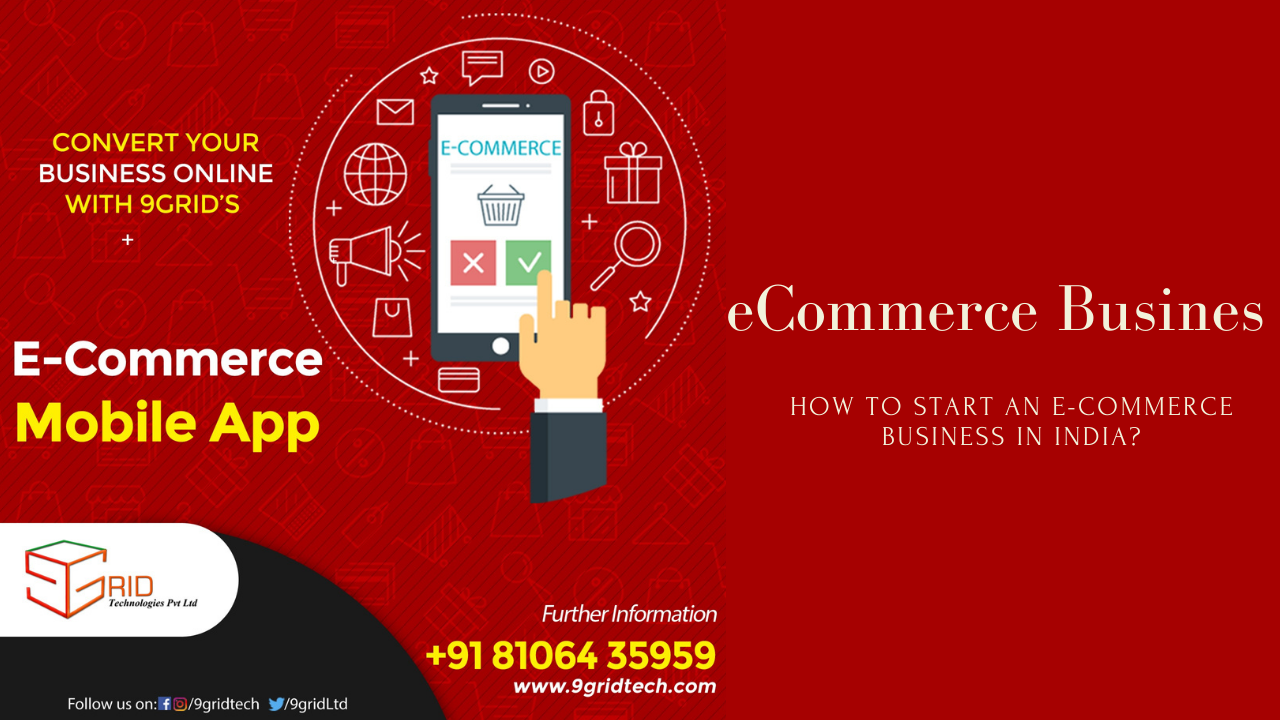There is a huge potential for growth in India for eCommerce Business especially after the Digital India campaign launched by the Government of India to digitally empower the country in the field of technology. The availability of internet services even in remote areas has given an opportunity to the small retailers and many aspiring entrepreneurs step into the eCommerce business. Many small and medium scale retailers are showing their interest to take their business online as it comes with few benefits.
So now, let us discuss How to Start your own eCommerce business in India from the scratch.
First, through online, we can reach a wider audience, a lot of marketing tools available for promotions, efficient marketing channels, flexible order management like, placing, processing, and delivering the order, and a lot of growth opportunities.
It is estimated that the eCommerce growth rate in India is about 25% and will hit $100 Billion by 2022.
Now let’s discuss different ways to set up an eCommerce Business in India. Please follow the below steps.
Steps to setup your eCommerce Business in India:
Research Ecommerce Business Models
Start Ecommerce Niche Research
eCommerce Platform
Register Your Ecommerce Business and Brand Name
Finalize Your Ecommerce Business Plan
Attract Customers to Your Ecommerce Website
Research Ecommerce Business Models:
There are several ways in which online business is conducted.
- Business to Business (B2B): Business buying or selling a good or service from/to another business via the internet is called B2B E-commerce. This actually involves products like software, raw materials, wholesale deals. Manufacturers can directly sell to retailers using B2B E-commerce.
- Business to Customer (B2C): If the sale is between a business and a customer, it is called B2C eCommerce. Buying a pair of shoes from an online retailer.
- Direct to Consumer (D2C): In this latest model of Ecommerce, brands are selling directly to the end customers without any distributors or retailers. Social Selling and Subscriptions through platforms like Instagram, Pinterest, Facebook, etc. comes under D2C eCommerce.
- Consumer to Consumer (C2C): The sale of a good or service from one customer to another customer is called C2C eCommerce. Consumer to consumer sales takes place on platforms like eBay, Amazon, Mercari, Etsy, Fiverr, etc.
- Consumer to Business (C2B): When an individual sells their products and services to a business organization it is called C2B E-commerce. Social Influencers, Photographers, Freelancers, and consultants, etc.
Choose the business model that fits your interest.
Start Ecommerce Niche Research:
- Let us try to understand the ‘Niche’ first. A niche is a definite segment where a specific product or a service is focused within any given market. Some best examples of Niche are Hand Made Wire Jewellery, Beard Oil, T-Shirts, Electronic Gadgets, etc.
- Define your niche, what definitive product or service that you want to sell online. Always look for a niche that you’re passionate about, look at people’s interest in that niche. There are tools like Google Trends that help you see what people have been searching for.
- Check for competition. See if anyone is already selling and look at their online presence. Select a niche that has less competition and that will help you succeed in your small business.
eCommerce Platform:
Depending on the business, you can choose which platform that you would like to set up your eCommerce business. There are two ways in which, you can do this.
- Join an Established eCommerce Marketplace: There are a lot of Established eCommerce Marketplaces like Amazon, Walmart, eBay, etc. You should have a bank account and GST number to apply. The marketplace will provide everything from website design and development, marketing, payment gateway, and no worrying about policy pages. It is a very easy way to start your online business.
- Starting your own eCommerce Website: This is a rather difficult decision as we have to create our own online business setup from Website creation and development to marketing setup, Payment gateway integration, and more. However, have your own online store, will help you develop your own brand image, it reduces dependency and very useful option in long run.
9Grid Technologies offer various eCommerce services, from setting up your online store and Billing Software setup, to providing Online Marketing services and Payment gateway integration, we will take care of everything for you.
Register Your Ecommerce Business and Brand Name:
- Company Registration – This would be the first step to start your online business. You must register your company. It is best to start with an LLP. You have to log in to the MCA (Ministry of Corporate Affairs) portal to Incorporate a new Company.
- Tax Registration – You should have a GST number in the name of your business, to start the online business.
- Business Bank Account – Once you setup your company or an LLP, apply for a bank account in your business name.
Finalize Your Ecommerce Business Plan:
A good business plan must focus on a predefined set of goals. It is like a strategic document of operational procedures you’ll ever set up for your company.
- Get an in-depth understanding of your business: What do you want to sell? who are your potential customers, term, and policies,
- Identify and gather all the tools that are necessary for your business: There are many types of resources like, Financial Resources, Physical resources, Online resources, and Human resources.
Financial resources: Small businesses generally start with relatively limited funds. They might look for financial support from a bank for a loan, a partner of financial means, an investor, etc.
Physical resources: It can be business premises, a computer with billing and accounting software, vehicles, machinery, posters, Internet service, etc
Online resources: Digital Marketing and Social Media tools.
Human Resource: You need talented and dedicated individuals on your team. Human Resources include employees, people in the supply chain, etc.
- Eye your competitors: Evaluate your competitor’s business, their strengths, and weaknesses. Analyze what we can learn from their mistakes and how we can restrain them from committing the same mistakes. Think, how to be more productive and produce good quality products than your rivals.
- Find new possibilities and opportunities: There are opportunities and one should know where to look. Leave no stone unturned, partnership with influencers and other businesses who are interested in you.
- Future Plan: Where do you want to be in the next 5 years or 10 years? Have a vision, set goals accordingly, and work with dedication to realize that vision.
Attract Customers to Your Ecommerce Website:
There are many ways to attract customers to your eCommerce store. It is never difficult to attract new customers. Please find the below points to understand better.
- Personalizing the Home page: Your home page is the first thing a visitor sees when he enters your website. It is like the face of your website. Make sure the page is appealing to the customers.
- High-Quality Content: Using high-quality images, videos and engaging text content will increase the chances of the customers buying the products.
- Blogging: Create a blog and write articles about the products that you sell. Educate the users on how to use the products, product information, features, interesting details about the products. This will help them engage with your store more and gives you a lot of visibility.
- Optimization: Optimize your website so that it has more search visibility on the search engine result page. SEO is a very important task for any online business. Employee a good SEO expert or an agency that can help you increase your search visibility.
- Email Lists: Running a well-designed email campaign is a powerful strategy to attract buyers to your eCommerce site. Integrate the signup forms on your site with the marketing campaigns. Organize a give away to generate useful information. Once you have the gathered user information, start an email campaign to encourage them to make a purchase.
- Running PPC Ads: PPC Ads are Search Engine Ads and Social Media Ads that will let you bid on specific keywords. Implementing a properly designed PPC Ad campaign will result in more conversions.
- Social Media: It is a very powerful tool to connect with your customers. Social media includes Facebook, Twitter, Instagram, Snapchat, Pinterest, and other online social platforms. It is estimated that 75% of the online users are either on Facebook or Twitter. It is a perfect way for your eCommerce business to reach out to your customers.
A very good Digital Marketing Team can help Attract Customers to Your Ecommerce Website. We offer Digital Marketing Services to all our clients.
9Grid technologies help you set up your very own eCommerce store. Our business solutions will help you in every step of your journey towards success. If you are an existing eCommerce business, we will provide advanced solutions, techniques, and a funnel that works for your business and can boost your sales.
Please fill out the Enquiry form to book a free consultation.

